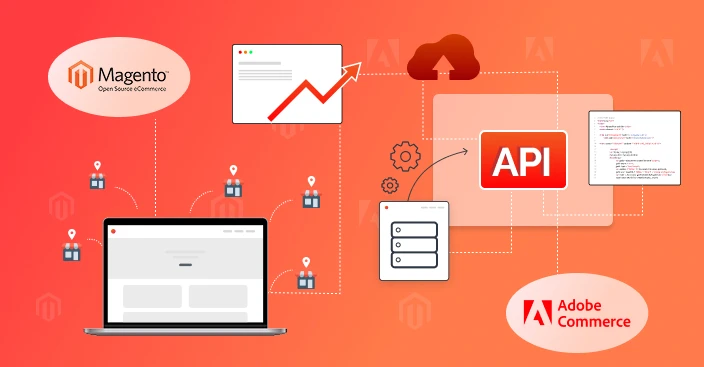Adobe Commerce vs Magento Open Source: A Comprehensive Comparison

Table of Contents
In the quickly evolving eCommerce market, choosing the right platform is essential to a brand’s growth, scalability, and online success.
Adobe Commerce and Magento Open Source are two excellent choices with a variety of features designed to satisfy various business requirements.
While Adobe Commerce serves mid-to-large businesses with sophisticated connectivity, cloud infrastructure, and artificial intelligence capabilities, Magento Open Source provides smaller organizations with flexible yet reasonably priced solutions.
This comprehensive study can help you decide which option is best for your business today and in the future. The basic comparison between Magento Open Source and Adobe Commerce will be covered in this blog.
Overview of Platforms
Magento Open Source, previously Magento Community Edition, is an affordable, open-source eCommerce platform specifically designed for small to medium-sized enterprises.
It provides fundamental functionalities such as product management, order tracking, and rudimentary marketing functionalities. Although it lacks advanced functionalities by default, its customizability facilitates talented developers to create robust stores from scratch.
Adobe Commerce, however, is the enterprise version based on Magento. Supported by Adobe, it offers advanced features like AI-powered product suggestions, sophisticated analytics, cloud infrastructure, and native integrations with Adobe’s digital suite.
It’s the best for enterprises looking for scalable, personalized experiences and robust B2B capabilities.
Core Features Comparison
Adobe Commerce: Enterprise-Grade Functionality
Adobe Commerce features a complete set of enterprise-level features tailored to the needs of rapidly scaling businesses. It supports advanced B2B functionality, customer segmentation, content staging, visual merchandising, and advanced analytics.
Adobe also offers solid cloud infrastructure with integrated performance monitoring, auto-patched security, and 24/7 technical support.
The pricing of the platform is based on the merchant’s yearly revenue, which makes it better for companies expecting fast growth and need to run enterprise-level services from day one.
Magento Open Source: Flexibility with the Essentials
Magento Open Source is an open-source, free platform well-suited for small businesses and startups. It has basic eCommerce functionality, including catalog management, flexible checkout processes, and simple order tracking.
Segmentation and analytics, however, need third-party modules or are developed as custom code. Companies based on Magento Open Source have to host themselves, apply security updates periodically, and deal with performance issues, quite often seeking the help of a Magento Open Source development agency or internal expert team.
Customization and Flexibility
Magento Open Source is a developer-oriented platform with a high degree of customization. Developers have access to the source code and can create custom store features and add third-party applications based on their needs.
It is a business-friendly solution for firms with in-house developers or collaborations with skilled Magento Open Source developers.
Adobe Commerce also accommodates wide-ranging customization, but with guided instructions and Adobe’s environment. It integrates well with Adobe Experience Manager eCommerce, allowing content personalization and promotional campaigns.
Although customization remains available, Adobe Commerce excels when used in conjunction with other Adobe digital solutions, thus making it best suited for combined digital experiences.
Scalability and Performance
Adobe Commerce is designed specifically for scalability. Its cloud architecture comes with features such as global CDN, automated backup, and elastic scaling, which enable it to support thousands of SKUs and large volumes of traffic without slowing down.
Adobe provides high uptime and improved performance through constant monitoring and support.
Magento Open Source is also scalable, but performance is host and technical implementation-dependent. Companies need to spend money on server optimization, caching, and content delivery networks.
For rapidly growing companies, Adobe Commerce has a better out-of-the-box solution for long-term scalability.

Integration Ecosystem
Adobe Commerce comes with native integrations with the Adobe product ecosystem such as Adobe Analytics, Adobe Sensei, Adobe Campaign, and Adobe Target.
This integrated strategy adds to personalization, customer analytics, and automation of marketing, making it ideal for omnichannel and business-scale growth.
Magento Open Source integrates via APIs and third-party plugins, providing flexibility but manual effort and testing.
While it facilitates most necessary integrations, companies seeking to build an end-to-end digital experience might get more value from the seamless integration of Adobe Commerce with Adobe’s digital experience tools and marketing platforms.
B2B and B2C Capabilities
Adobe Commerce comes with out-of-the-box B2B functionality, including company accounts, custom catalogs, pricing, requisition lists, and efficient quote workflows. These features make it perfectly suited for manufacturers, wholesalers, and distributors with intricate organizational relationships and bulk purchases.
Magento Open Source is also applicable for B2B businesses, but it needs extra modules or custom development.
As much as it performs perfectly in B2C companies and smaller-scale B2B configurations, the large-scale, complex B2B needs will be best met with Adobe Commerce because of its in-built support and smooth workflows.
Support and Community
Magento Open Source has a huge, vibrant community of developers, contributors, and solution providers. Although community support is strong, official support is not available.
Companies have to bank on internal teams or agencies for support, upgrades, and troubleshooting, and this can at times result in tardy resolution.
Adobe Commerce, on the other hand, offers committed technical support from Adobe, with service-level agreements (SLAs), performance monitoring, and proactive security patches.
Brands engaged with a seasoned Adobe Commerce agency have access to both Adobe’s and the agency’s experience, with constant growth and support.
Security and Compliance
Adobe Commerce features enterprise-level security features such as DDoS protection, Web Application Firewall (WAF), two-factor authentication, and automated vulnerability scans. Adobe provides PCI compliance and proactive security patching, which lessens the workload on the internal IT department.
Magento Open Source necessitates manual application of security patches and additional modules for stronger protection. Companies need to ensure that their hosting environment is secure and their development teams are updated with patches.
Adobe Commerce provides stronger inherent compliance tools for companies in regulated environments.
Analytics and Business Intelligence
Adobe Commerce includes built-in business intelligence features that enable merchants to study customer behavior, sales performance, and inventory trends. Adobe Sensei also boosts predictive analysis to enable businesses to make data-driven decisions and serve up personalized shopping experiences.
Magento Open Source includes standard reporting features and has integration capabilities with tools such as Google Analytics.
Although sufficient for small businesses, it does not have native BI functionality. For data-centric companies, Adobe Commerce’s analytics solution provides much deeper insight and value from customer and sales information.
Cost of Ownership
Magento Open Source is free to download and implement, but incurs costs through hosting, custom development, upkeep, and security. It’s an affordable choice for new ventures, as long as they have technical resources or a qualified agency to handle the platform efficiently.
Adobe Commerce comes with a license fee that adjusts based on your gross merchandise value (GMV), but with cloud infrastructure, support, updates, and built-in tools as well.
For high-volume businesses, the overall cost might be more stable and easier to handle, providing better ROI through lower overhead and more streamlined operations.
Magento Commerce Cloud vs Magento Open Source
Magento Commerce as Adobe Commerce, features managed hosting, CI/CD pipelines, staging environments, auto-scaling, and performance monitoring. They mitigate the technical teams’ workload and provide enterprise-level performance with little manual intervention.
Magento Open Source does not have these cloud-native capabilities, and merchants must personally arrange for hosting setup, deploy updates manually, and implement development pipelines on their own. Though more flexible, it requires more technical savvy and continuous resource allocation.
Time to Market and Implementation Speed
Adobe Commerce provides a quicker time-to-market for mid-sized to large organizations because of its powerful cloud infrastructure, integrated features, and efficient deployment practices.
Powered by access to CI/CD pipelines, pre-integrated Adobe services, and enterprise support, Adobe Commerce enables organizations to accelerate the launch and scaling of their digital stores. This is particularly beneficial for organizations that have stringent deadlines or are launching into competitive markets.
Magento Open Source, though more flexible, typically takes longer to set up, configure, and integrate. Custom development, third-party plugin validation, and hosting configurations can push back the implementation schedule.
Companies require experienced developers or a Magento Open Source development firm to make sure timely and successful launches. Although the trade-off is greater flexibility, it can push back timing-sensitive go-to-market objectives.
User Experience and Personalization
Adobe Commerce leads the way in providing a better user experience through AI-powered personalization capabilities built on Adobe Sensei. It allows companies to personalize product recommendations, promotions, and search results using customer behavior.
Using integrated capabilities such as Adobe Target and Adobe Experience Manager, merchants can create dynamic and customer-specific journeys across channels.
Magento Open Source offers a simple but customizable user interface.
Personalization needs to be executed by way of custom development or third-party extensions. Although it does enable businesses to influence the UI/UX to align with brand identity, delivering a personalized experience at scale will take extra resources and planning.

Multi-Store and Global Expansion
Adobe Commerce facilitates the management of multiple stores effortlessly. Companies can handle various brands, storefronts, currencies, and languages in one backend.
It’s perfect for an international operations business, which has different regional storefronts. International shipping integrations, localized content, and global compliance tools make it more appropriate for global commerce.
Magento Open Source additionally allows for multi-store capabilities but entails more hands-on planning and resource setup. Expansion worldwide is feasible, but currencies, tax regulations, and localization require additional configuration.
For companies beginning with a single store but anticipating future growth overseas, Adobe Commerce makes future management and growth easier.
What Platform Should You Use?
Magento Open Source is ideal for cost-sensitive startups and companies that enjoy good developer support, with total control over customizations. It provides flexibility at the cost of constant hands-on maintenance. It is ideal for starting small and scaling in an incremental manner.
Adobe Commerce, on the other hand, is for mid-market through enterprise-sized businesses wanting strong B2B functionality, sophisticated marketing capabilities, and intuitive scalability. When used in conjunction with an experienced Adobe Commerce agency can force multiplier for digital transformation and sustained eCommerce success.
Final Thoughts
The decision between Adobe Commerce and Magento Open Source will mostly rely on your business size, technical strengths, and long-term objectives.
Although Magento Open Source is an excellent beginning, Adobe Commerce provides a future-proof platform for expanding businesses wishing to take advantage of AI, analytics, and high-level integrations.
Working with skilled Adobe Commerce developers and partners will ensure that you make the most of your investment in your platform.
FAQs
 Which platform is better for migration among Adobe Commerce or Magento?
Which platform is better for migration among Adobe Commerce or Magento?
The needs of your company will determine that. Adobe Commerce can be a better choice if you are looking for better scalability, integrations and advanced b2b. On the other side, for businesses looking for a flexible and affordable choice, Magento open-source can be a perfect one.
 Can Magneto IT Solutions help you with Magento Open Source to Adobe Commerce migrations?
Can Magneto IT Solutions help you with Magento Open Source to Adobe Commerce migrations?
Yes. Our team of Magento and Adobe Commerce experts can help deliver end-to-end services, including better data integrity, zero downtime, and better speed optimization. We are an experienced Adobe Commerce agency, helps deliver simple migration services from Magento Open Source to Adobe Commerce.
 Can you share the most important integration differences between Adobe Commerce and Magento Open Source?
Can you share the most important integration differences between Adobe Commerce and Magento Open Source?
Adobe Commerce is good with native integration with the Adobe product suite, which consists of Adobe Analytics, Adobe Experience Manager eCommerce, and Adobe Sensei. On the other side, Magento Open Source requires third-party plugins or distinct APIs.
 What maintenance is required for Magento Open Source compared to Adobe Commerce?
What maintenance is required for Magento Open Source compared to Adobe Commerce?
Adobe Commerce needs less maintenance because of its official support and managed cloud infrastructure. For Magento Open Source, regular manual server maintenance, patching, and updates must be carried out by your developer or agency.



